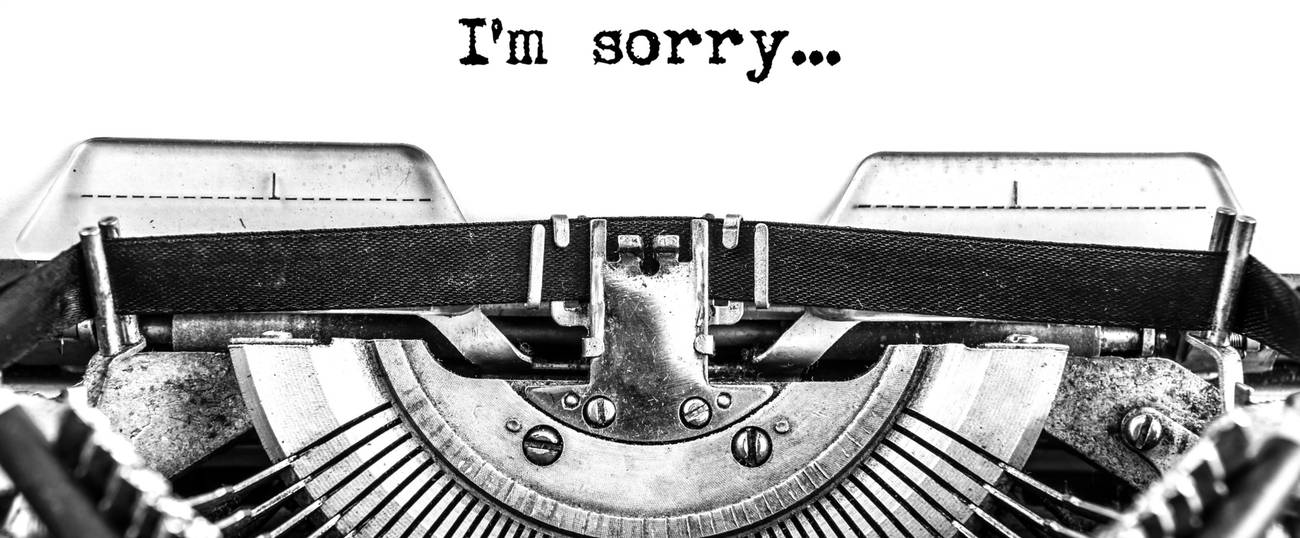When Sorry Isn’t Good Enough
There’s something wrong with the apology from a Cleveland doctor who joked about giving Jews the wrong medicine, and with the media coverage of her public contrition




I came across an apology yesterday—I should probably mention here that I run SorryWatch, an apology watchdog site—and in my capacity as an expert critic of contrition I found it especially horrid. Initially, though, I didn’t want to touch it. I’ll tell you about the apology first, and the reason I shied away afterward.
The story: Laura Kollab, a former medical resident at the Cleveland Clinic, was fired last September after the clinic learned about dozens of anti-Semitic tweets she’d sent out between 2011 and 2017. In the following examples, the spelling, punctuation and capitalization are hers.
The most horrifying tweet said, “hahha ewww.. ill purposely give all the yahood the wrong meds…” Other tweets called Jews “dogs”; referred to America’s “zionist-owned media”; complained “why is this airport literally full of Jews”; noted “if I do something really stupid I say ‘hebel yihbilhom el yahood’ [stupid, stupid Jews] hehe”; and said “everything that goes wrong, i say ‘allah yo5od el yahood’ [Allah will kill the Jews] :P.” She asked, “why don’t you create a hat or something as a symbol of your nazi…er jewish…Pride.” She tweeted about a college class: “I have to watch a movie on the holocaust and write a paper on it. I am going to be brutally unsympathetic. #sorrynotsorry” and said in an additional tweet about the class, “Poor Jews. They’re so oppressed.” She also called the Holocaust “exaggerated.”
On New Year’s Eve, the Cleveland Clinic issued a statement saying that her employment had been terminated. “In no way do these beliefs reflect those of our organization,” the clinic said. “We fully embrace diversity, inclusion and a culture of safety and respect across our entire health system.”
Kollab deleted the tweets and deactivated her social media accounts. Then, on Jan. 4, she apologized. Go read the apology on her blog; then I’ll tell you why it’s lousy.
She starts off evasively, noting “social media comments posted on my twitter account years ago have surfaced recently.” Posted on her Twitter account by whom? There’s no ownership of her own actions; the use of passive voice means avoiding the word “I” and any action verbs. And of course “years ago” is a way of minimizing: Protesting that “I was young” is de rigueur for anyone caught saying racist, homophobic or misogynist things on social media. Ryan Lochte, for instance, was repeatedly excused as “a young man” (he was 32) after drunkenly trashing a Brazilian gas station and then lying about it. Kollab was younger—in her late teens and early 20s for most of the posts—but nonetheless, old enough to know better. Still, that’s not a deal-breaker in terms of forgiveness: We have to believe that people are capable of learning and growing. But first they have to demonstrate that they understand what they did wrong.
Kollab doesn’t. At no point does she say precisely what she’s apologizing for. A good apology: 1. Uses the words “I’m sorry” or “I apologize” (she does that! Yay!) 2. Is specific about what one is apologizing for (nope) 3. Makes clear that one understands the impact of one’s words or actions on others (nope again), 4. Makes clear how this won’t happen again (yay again! she does that by saying that she’s now “adopted strong values of inclusion, tolerance, and humanity,” and noting, “I take my profession and the Hippocratic oath seriously,” meaning that she will not actually give Jews the wrong meds, though she never spells out that this tweet is what she’s referring to) and 5. Makes amends. Explanation of one’s actions can be illuminating but is more often risky, because it easily veers into excuse-making, as it does here: She said bad things about Jews because Palestine. No. The worst problem, though, is that she uses her (completely valid!) sympathy for Palestinians as a rationale for her hatred of Jews. Pointing to the plight of the Palestinians as an excuse for anti-Semitism is akin to Kevin Spacey attempting to distract us from accusations of child sexual abuse by talking about being a proud gay man.
And again: If you don’t tell us what you said, making clear just how bad the statements were, even if it is personally embarrassing to you, it’s hard to read your apology as genuine. This is a flaw in media reporting about apologies, too: If the apologizer doesn’t say what they’re apologizing for, it’s up to the media outlet to do it. Otherwise, reporting on the apology is as incomplete as a story about a trial verdict that never mentions the alleged crimes. (My other SorrryWatch pet peeve is newspapers using “apologizes” in a headline when the story is about someone expressing regret. Regret is not apology.)
In sum: You can’t truly own an apology—or make clear that you understand why your words or actions upset others, or move forward ethically and open-heartedly—without saying precisely what you’re apologizing for. That is decidedly missing both in Kollab’s statement and in much of the media coverage that followed it.
However, and this is a big, however: I am less than eager to promote the work of Canary Mission, the organization that broke this news. Canary Mission is a shadowy organization that has repeatedly focused on finding dirt on undergraduate pro-Palestine activists. It’s anonymous, sweeping, and creepy. And, it turns out, secretly funded by Jewish Federation. Not Good. If Jews want to be crystal clear that being anti-Semitic and being anti-Israel are two completely different things, we can’t ourselves muddy the waters this way. That’s doing exactly what Kollab did.
Marjorie Ingall is a former columnist for Tablet, the author of Mamaleh Knows Best, and a frequent contributor to the New York Times Book Review.